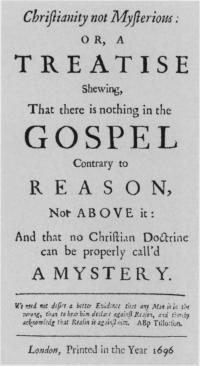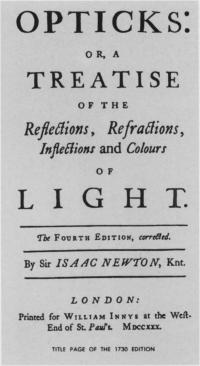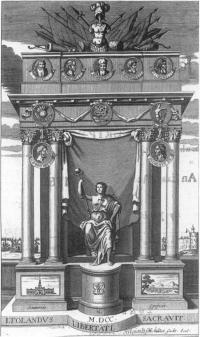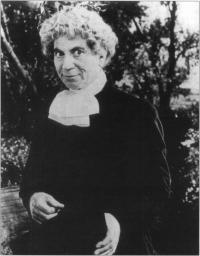‘The Hue and Cry of Heresy’ John Toland, Isaac Newton & the Social Context of Scientists
Published in 18th-19th Century Social Perspectives, 18th–19th - Century History, Early Modern History (1500–1700), Early Modern History Social Perspectives, Features, Issue 4 (Winter 1996), Volume 4![Sir Isaac Newton by Sir Godfrey Kneller[1702].(Courtesy of National Portrait Gallery, London)](/wp-content/uploads/2013/02/87_small_1305213563.jpg)
Sir Isaac Newton by Sir Godfrey Kneller[1702].
(Courtesy of National Portrait Gallery, London)
Every schoolgirl has heard the story of Newton and the apple. But dig deeper into the science and society in which Newton was embedded, and one is allowed not only a fascinating insight into the use and abuse of science by ideologues, but also a glimpse into how the particular social situation of a scientist can affect their scientific-philosophical conclusions. Newton’s mechanics—as developed in Principia (1687)—revolutionised science. In Opticks (1704), he described a series of experiments with light which were easily reproduceable by the interested reader. This ease of reproducibility played no small part in disseminating a knowledge of and respect for science among educated people in the eighteenth century. At the back of Opticks was a collection of ‘queries’ wherein Newton gave full vent to his philosophical conjectures on the nature of phenomena. This rendered Opticks a curious yet compelling mélange of easily replicated experiments and occasionally wild speculation. The influence of Principia and Opticks on contemporary society when they were published cannot be overstated. These books moulded astronomy, chemistry, physics, physiology and the thinking of philosophers and theologians. No current scientist is as well-known as Newton was in his day.
![The only known portrait of John Toland, as it appeared in vol.3 of U.G. Thorschmid's Versuch einer Vollstandige Englandische Ferydenker- Bibliothek[1766].(Sterling Memorial Library, Yale University)](/wp-content/uploads/2013/02/87_small_1305213998.jpg)
The only known portrait of John Toland, as it appeared in vol.3 of U.G. Thorschmid’s Versuch einer Vollstandige Englandische Ferydenker- Bibliothek[1766].(Sterling Memorial Library, Yale University)
The triumph of Newton was complete in both science and society. Already Lucasian Professor of Mathematics in Cambridge at the age of twenty-seven (a post now held by Stephen Hawking), he became an MP in the aftermath of the Williamite settlement in 1689. Cleric and radical alike embraced his scientific achievements with enthusiasm. By the late 1680s, Principia was being taught at universities. Indeed, it is extremely likely that Toland studied the book at Edinburgh under David Gregory. At the same time, the Newtonian system was being appropriated by the new post-1688 English ruling class. The accession of James II had threatened to unify papists with atheists and sectaries and destroy the Reformation in England. The stability of Newton’s cosmos could also be applied to Williamite civil society and yield a stable and harmonious order which kept the privileged at the apex of power.
After the success of the Glorious Revolution of 1688, the Catholic menace had receded, but there was still a threat to social stability from the religious and political radicals. On the death of Robert Boyle (the Irish formulator of the law governing the inverse relationship between temperature and pressure in gases) in 1691, a series of annual lectures was provided for in his will, their purpose being to advance the Christian religion ‘against notorious Infidels, namely, Atheists, Theists, Pagans, Jews, and Mahometans’. The early lecturers became known as the Newtonians. One commentator has described the ‘Boyle lectures’ as ‘the most influential and widely read lectures ever delivered in the eighteenth century’. The world-view expressed in these lectures was that of a stable society immune to change. God was indeed in his heaven and all was well with the world.
 Christianity Not Mysterious
Christianity Not Mysterious
With the lapsing of the Licensing Act in 1695 and the consequent relaxation of censorship, John Toland was preparing to publish Christianity Not Mysterious. He proposed that reason replace mystery in Christianity:
Since Religion is calculated for reasonable Creatures, ‘tis Conviction and not Authority that should bear Weight with them. A wise and good Man…knows no Difference between Popish Infallibility, and being oblig’d blindly to acquiesce in the Decisions of fallible Protestants.
Toland considered popery to be the attempt by the powerful—whether in politics or religion—to constrain the thoughts of the individual. In effect, he suggested that popery existed in the Established Church as well as in the Church of Rome: in a later work he stated, ‘there may very well be such a thing as Protestant Popery’. Outrage greeted Toland’s literary bombshell. The Irish Parliament ordered the book to be burnt by the common hangman. To suggest that the post-1690s Irish ruling class were as much adherents of popery as were Catholics was the ultimate heresy in Ireland because it decisively undermined the justification for Protestant rule. No wonder the Dublin elite burned it and hounded Toland out of the island! One commentator describes the impact of Toland on such privileged circles:
An Irish peer gave it as a reason why he had ceased to attend church that once he heard something there about his Saviour, Jesus Christ, but now all the discourse was about one John Toland.
In the eyes of the Newtonians, such a book evidenced the continuing rise of atheistical tendencies. Friends of the eminent scientist were urged to ‘keep Sir Isaac Newton at work, that we may have…his thoughts about God’. However, Toland hadn’t finished upsetting the cosily-stacked Newtonian-Anglican applecart. In 1696 he had unearthed a copy of Lo Spaccio de la Bestia Trifontane by the Italian Renaissance philosopher Giordano Bruno (1548-1600) [known in English as The Expulsion of the Triumphant Beast]. This book—Bruno’s most scathing attack on the Roman Church—had a huge influence on Toland. In it Bruno stated that God is the source of all change in matter which is in constant motion. Bruno also believed that the Sun was one of an infinite number of stars, and that life may exist elsewhere in the Universe. Unsurprisingly, Bruno was declared a heretic. Spaccio cost him his life: it was the only book mentioned in the sentence of death by auto da fé handed down by the Cardinal-Inquisitor. And no wonder! Many took the Bestia to be the Pope himself. Toland disagreed, being convinced that Bruno was referring to revealed religion:
either paganism, or Judaism, or Christianity; he [Bruno] attacks and ridicules them and rejects them all equally without ceremony or exception.
The signature of Bruno’s ideas on motion and matter is evident throughout Toland’s Letters to Serena (1704). In Serena, matter is one, motion is inherent in matter, and no void exists. Toland’s matter is the source of life itself, whereas Newtonian matter is ‘sluggish, inactive, brute and stupid’. Toland fully accepted Newton’s physics. In fact he was one of the first writers to bring word of Newton’s science into France. However, he argued that Newton’s interpretation of his own laws was not the only possible interpretation.
The acceptance of Newton’s physics in Letters to Serena by the most notorious freethinker of the time had the effect of making Newton somewhat suspect to orthodox Anglicans. The first edition of Opticks (1704) had only sixteen queries; Newton added seven more between 1704 and the 1706 Latin version. However, there is in existence an early draft of the twenty-third query which differs significantly from the later (published) version. Thus Newton wrote and rewrote this query between the publication of Serena, and the Latin edition of Opticks in 1706. Here he tried to grapple with the significance of Toland’s hylozoism [the doctrine that all matter has life]. The draft version of the twenty-third query states:
it seems to have been an ancient opinion that matter depends upon a Deity for its laws of motion as well as for its existence. These are passive laws and to affirm that there are no others is to speak against experience. …all matter duly formed is attended with signes of life.
This text does not appear in the final version of query twenty-three. As the person who had given the English ruling class its ideological justification, publicly stating that ‘all matter duly formed is attended with signes of life’ would have undermined the status quo and aligned Newton with Toland and the heretic Bruno! One suspects that Newton may have become a prisoner of his own ideology, trapped in the cul-de-sac of orthodoxy.
 Organs attributed to God?
Organs attributed to God?
Rupert Hall discusses another example of self-censorship by Isaac Newton after Letters to Serena was published. In query twenty-eight of Optice—the 1706 Latin version of Opticks—Newton originally stated:
Is not universal space the sensorium [place of sensation] of a Being Incorporeal, Living and Intelligent, because he sees and discerns, in the inmost and most Thorough Manner, the Very Things themselves, and comprehends them as being entirely and immediately Present within Himself.
However, after this was printed, either Newton or Samuel Clarke, one of the Boyle lecturers, realised that to admit that universal space was the place of God’s knowledge was to flirt with heresy. A ‘cancel sheet’ was inserted and the new text read:
does it not appear from Phenomena that there is a Being incorporeal, living, intelligent, omnipresent, who in infinite Space, as it were in his Sensory, sees the things themselves intimately, and thoroughly perceives them, and comprehends them wholly by their immediate presence to himself.
Although Newton’s new God is omnipresent, no longer are things ‘present within Himself’; rather, ‘presence to himself’ implies a God somewhat above and beyond the cosmos.
Unfortunately for Newton, an original copy of the 1706 Optice was read by his arch-rival Leibniz, who was greatly disturbed by the pantheistic sympathies expressed in query twenty-eight. Leibniz translated ‘sensorium’ as meaning ‘the organ of sensation’ and he protested to Newton via Clarke that Newton was attributing organs to God! Clarke, in reply, denied this, unaware that Leibniz had seen the original Optice text. In the 1717 edition of Opticks, Newton disclaimed the idea of God having organs, saying that
we are not to consider the World as the Body of God, or the several Parts thereof, as the Parts of God. He is an uniform Being, devoid of Organs, Members and Parts, and they are his Creatures subordinate to him, and subservient to his Will.
Newton was here attempting to distance his speculations from pantheism. On another occasion he stated:
Indeed however we cast about we find almost no other reason for atheism than this notion of bodies having, as it were, a complete, absolute and independent reality in themselves.
Newton believed—as did many others—that pantheism was identical to atheism.
What the above two examples suggest is that Newton was publicly distancing himself from the idea of God being at the heart of all matter. It is not clear if Newton privately accepted this distancing. Newton’s friend—and Toland’s teacher—David Gregory suggested that this may not have been the case, stating ‘he [Isaac Newton] believes God to be omnipresent in the literal sense’. Newton may have felt it politic to distance himself from the freethinkers. It was not in Newton’s interest to draw the suspicions of the orthodox clergy upon himself. He was extremely anti-Catholic, but he also denied the trinitarian doctrines of the Anglican Church. Although a deeply religious man, Newton had become convinced by the 1670s that scripture and Christianity had been deliberately corrupted in the fourth and fifth centuries, a claim that Toland strongly propounds in Christianity Not Mysterious. Newton was not as hostile to the freethinkers as the Newtonians. He was involved with a Dutch literary journal which associates of Toland published and may well have felt at home in the coffee-house milieu which had sprung up in late seventeenth-century London.
Let us return to the philosophical and spiritual implications of Newton’s estrangement from a pantheistic God. If God is made more remote from matter one is then faced with a need to explain how God can effect action in the universe. Newton’s solution—like many scientists before him—was to invoke the ether. The notion of the ether originated in ancient Greece as the divine rarefied kind of air—the fifth element [quintessence]—surrounding the Earth. Aristotle held that the ether was incorruptible, unlike the other four elements (earth, air, fire, water). However, Newton realised that any such medium would cause the planets to drag and eventually slow down and this had not been observed. At the same time, he refused to accept the idea that any action could take place at a distance without a medium of some kind. No such problem faced the pantheist: the ether was philosophically superfluous. If God was everywhere, there was no need for this extra medium permeating the cosmos.
In 1887, Albert Michelson and Edward Morley set out to prove the existence of ether by splitting a beam of light, deflecting one half at right angles and measuring the relative velocities. They expected the flow of ether to impede the velocity of one relative to the other. In the event no difference was discernible, thus disproving the ether hypothesis: it has become known as ‘the most famous experiment-that-failed’. Building on this result and on the work of the Irishman George Francis Fitzgerald (1851-1901) and Hendrik Lorentz, Albert Einstein proposed his Special Theory of Relativity in 1905. One wonders if it would have taken so long to disprove the ether hypothesis had pantheistic ideas been taken more seriously by Newton and the Newtonians.
Why were the Newtonians so opposed to Toland, pantheism, and the freethinkers? Throughout his writings, one finds a consistency in Toland’s declamations. If he concluded some truth about the natural world then he sought analogies in the turmoil of human behaviour. Like Hegel, Toland believed passionately that ‘das Wahre is das Ganze’ [‘the true is the whole’]. Toland was feared by the Newtonians because he believed that if the universe was in ‘perpetual flux’, then so was the political world:
All things are in a perpetual Flux, nothing permanent or in every Regard the same for one Moment. But none of them is so visibly subject to such Variations, as Kingdoms, States, and (in a word) all sorts of Governments.

Illustration from Toland’s Oceana of James Harrington (1700).
Free love versus free trade
We tend to think today of scientists as disinterested pursuers of truth. In the late seventeenth and early eighteenth centuries, however, science had not the pre-eminence it possesses today. The Stuart-Williamite transition had been a traumatic one for conservatives and many believed that science itself was responsible for the growth of religious and philosophical heterodoxy, in a word ‘atheism’. Scientists were forced to respond to this pressure by stressing the worthy moral characteristics of scientists, fiercely attacking ‘atheism’ and accepting the political and economic status quo. Some prominent scientists (for example Boyle and, arguably, Newton) were even fervent believers in miracles. Margaret Jacob has pointed out that ‘freethinker’ conjures up the French word ‘libertin’ and Anglican clergy were not slow to denounce dissolute lifestyles, the implication being that freethinkers lived in the coffee-houses and possessed questionable morals. Perhaps it was a case of free love against free trade since Newtonians argued strongly for self-interest in a cosmically-ordered market economy poised to take full advantage of England’s coming primacy on the high seas and in North America.
Toland had unambiguously thrown down the gauntlet to the Williamite ruling class in Letters to Serena. Pantheism led inevitably to political democracy: if the universe needed no Grand Architect controlling from above, England needed no king. The republican genie of the Levellers which had been brutally confined in the 1640s by Cromwell was now well and truly out of the bottle. The counter-attack was quick in coming. Samuel Clarke gave the 1704-05 Boyle lectures and denounced Toland—as well as Hobbes and Spinoza—as atheists. Clarke argued, on the basis of Newton’s philosophical arguments presented in Opticks, that nature can only be explained by observation from experiments, i.e. from reasoning by induction, whereas Toland was deducing the nature of matter from his own principles. The fact that much of Newton’s speculations in Opticks’ queries was not based on evidence seems to have been lost on Clarke.
By allying Newton’s achievements so closely with the Anglican establishment, the Newtonians arguably stifled the growth of science. Excessive reliance on the speculations of the Queries delayed the growth of experimental sciences such as chemistry and physiology. The Newtonian scientific paradigm lasted from 1687 until the work of Max Planck, Albert Einstein and others in the early years of this century. One could argue that a body of work which lasted for over two hundred years must be treated with huge respect and, indeed, Newton’s scientific achievements

Harpo Marx as Newton in the 1957 film
‘The story of mankind’.
were gargantuan, but the hijacking of Newton’s speculations in the Queries by conservative ideologues led to the imposition of a rigid scientific orthodoxy which also took God out of everyday life for many.
It is also worth noting that, by refusing to accept the pantheistic musings of Toland and others, both Church and State could not adapt philosophically to the great eighteenth-century social swarm of change which was brought to a head in the French Revolution. Edmund Burke, commenting on that momentous event, wrote that ‘a state without the means of some change is without the means of its conservation’. Eighteenth-century science had removed God from the universe, seeing the cosmos as being like a clockwork model which, once wound up, had no further need of God. This God, outside of the universe was one that many could not relate to, or even believe in. The growth of unbelief during the Age of Reason was to threaten the stability of societies, especially where the monarch was absolute and regarded as divine, as in France. As Albert Camus wrote in The Rebel, ‘if God is denied, the king must die’.
In time to come, the theories of Relativity and Quantum Mechanics may well be seen as the greatest achievement of humanity this century. Jacob Bronowski has called physics ‘the great collective work of art of the twentieth century’: computers, medical physics, the Hubble Space Telescope and the Internet would still be in the realms of fantasy without the contributions of modern physics.
What have scientists had to say about matter and God? Werner Heisenberg informs us:
in the natural science of the nineteenth century…matter and force are two distinctly different aspects of the corporeal world. …in the most recent development of modern physics this distinction between force and matter is completely lost.
When Erwin Schrodinger worked at the Dublin Institute of Advanced Studies in mid-century he was also an enthusiastic student of Eastern philosophies. He saw science as
a game…here you strive against the imaginary boundary between yourself and the Godhead—a boundary that perhaps does not exist.
Schrodinger liked nothing more than to go walking in the Wicklow Mountains where he would argue in favour of pantheism. Ernan McMullin—a fellow-hiker and Catholic priest from Toland’s native county—recalled that Schrodinger was ‘far too interested in religion to be an atheist’. One feels that the same can be said about Toland, who would surely feel at home in the company of the great modern physicists. There should always be room for the maverick in science. The renowned scientist and writer Freeman Dyson has argued that ‘there is no such thing as a unique scientific vision…the common element is rebellion’.
Science is regarded today as having originated from the armchair musings of the ancient Greeks. I suggest that Toland exemplifies such philosophers/scientists/polymaths for whom nothing must be compartmentalised and who sees an interconnectedness in everything. If Marco Polo and Christopher Columbus can be regarded as scientists by Isaac Asimov—a leading biographer of scientists—certainly Toland has as much claim as those mere explorers. Indeed, for a time, Toland had a keen interest in geology. He also propounded theories on the origin of fossils which—while seeming quaint to the modern reader—were meant to undermine mysterious and outlandish explanations such as Noah’s deluge. Although he derived his natural philosophy for the most part from intuition and experience rather than from experimental observation, we should not be too hard on him. Einstein’s Theory of Relativity resulted from ‘thought-experiments’ and Aristotle was convinced that women had less teeth than men, though as Bertrand Russell pointed out, presumably he never saw fit to look into his wife’s mouth! Today is the age of the specialist. We need more relentless synthesists such as Toland to help us see the unity of humanity, society and cosmology.
Philip McGuinness is a physics postgraduate student at the Queen’s University, Belfast.
Further reading:
A.R. Hall, All Was Light: an introduction to Newton’s Opticks (Oxford 1993).
M. Jacob, The Newtonians and the English Revolution 1689-1720 (Ithaca 1976).
R. Kearney, A. Harrison and P. McGuinness (eds.), John Toland’s Christianity Not Mysterious (Dublin forthcoming).
J. Toland, Letters to Serena (London 1704).
















